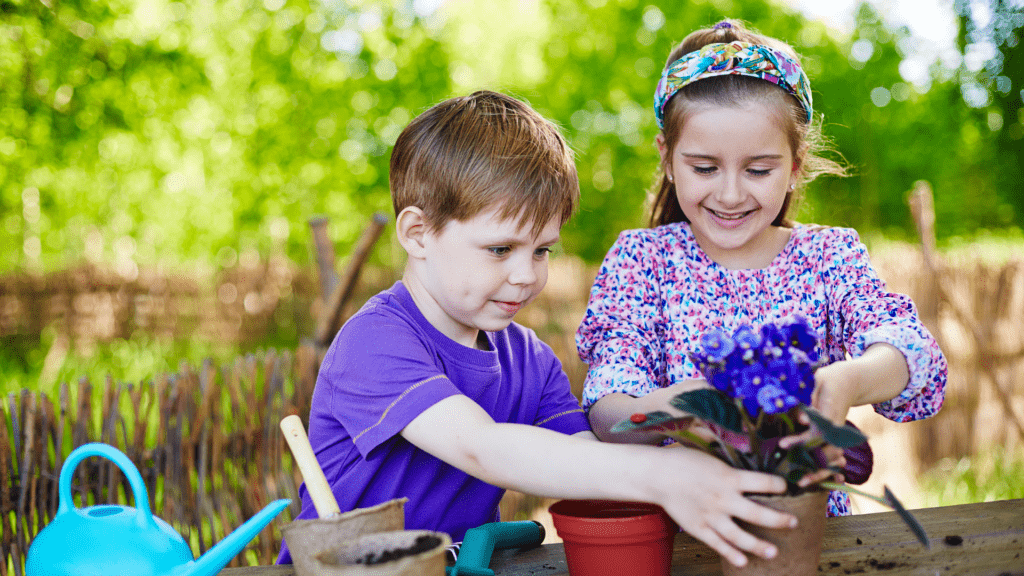“Play is the work of the child,” quipped Maria Montessori, who went on to craft an approach to education that builds on the way children learn naturally.
Young children quite easily find themselves at play, which opens them up to learn about the world around them.
Pay attention to what happens at the park as preschoolers begin to bump into one another, exchange a few words, and then ditch the playground equipment to traipse over to the woods where they turn tree overhangs into forts and wield sticks as magic wands. Imagination and play are at work, and your child’s world expands.
As children grow, play can go a few ways: it can get trumped by screen time or even by organized sports with soccer schedules that rival that of a CEO. But it doesn’t have to be that way!
In fact, colleges are looking for kids who practice play though an extracurricular activity—something that they regularly participate in outside of their normal academic classes.
While there’s nothing wrong with screens (they are necessary for most STEM-based extracurriculars) or athletics (a sport is a time-proven way to get exercise and gain invaluable life skills as a teammate), check out the many ways below where you can help your child develop through play once their preschool years are behind them.
We categorized these into four categories to help you search: art, exercise, STEM, and DIY. Scroll down for a full explanation of each category and lots of ideas to enrich your child’s life!
Art-Based Extracurriculars
In the arts we include everything from learning a musical instrument to crocheting a scarf and sculpting clay.
Playing with the arts develops fine motor skills, enhances creativity, invites music exposure, and builds confidence in your child. Check out the many ways to draw out the artist in your kid:
1. Theater
Working with others toward a cumulative experience like a play or drama is so rewarding! The beauty of joining a theater club is that your child can explore whether they prefer a behind-the-scenes job or starring on stage.
Memorizing lines or learning about set design simultaneously teaches teamwork and the reward of careful work—making theater one of our favorite extracurricular activities for kids.
2. Cooking
There is no shortage of ways you can get kids cooking in the kitchen! From a class at a local kitchen store to inviting friends over to explore an at-home cooking kit, learning to make a meal or decorate a cake is one of life’s greatest skills for a child to learn.
3. Photography & Photo Editing
Taking a photo has never been easier thanks to smartphones, but the art of editing, organizing, printing, and displaying a photo is somewhat lost and is a valuable skill your child may really enjoy.
There are classes that help them develop an eye for compelling angles and interesting frames to make each photo uniquely their own.
4. Choir
Learning the elements of singing and then working with others to produce a choral performance can be a crowning achievement in a kid’s life!
They may be invited with their choir to perform at special events and holidays and learn the benefits of public performance.
5. Musical Instrument
While most schools provide a unit on the recorder, there is also ample opportunity for your student to find their place in a band or orchestra by taking guitar or violin lessons.
While piano is a classic instrument to learn, they may enjoy the social opportunities offered at various music and rock schools where they can learn to play music alongside others.

6. Clay sculpting and Pottery
Clay can have a therapeutic effect as it engages the senses and produces a 3D piece that kids can be proud of.
Most art studios in town will offer some sort of clay class for kids whether they make a coil pot by rolling clay with their hands or even begin throwing a pot on a pottery wheel.
7. Sewing/Crocheting
Believe it or not, your local library is a good place to begin if you want to learn more about sewing or crocheting—there are all sort of introductory books available for checkout.
Some will even loan you a sewing machine using your library card! From there, look into your city’s recreation programs or local sewing clubs to begin learning this craft with others.
8. Painting/Drawing
Painting and drawing classes and clubs abound and are an easy activity to join. Kids will get familiar with brushes, pencils, and various mediums and techniques while creating pieces to share or display at home.
Exercise-Based Extracurriculars
When children are very young, watch how they run at every opportunity. Someone’s ringing the doorbell? Sprint for the door! Snack time? Now they’re running into the kitchen! Jumping out of the car? Yep, and and now try to stop them before they run through the parking lot!
They remind us that our bodies are made to move, and that as we get older extracurricular activities rooted in movement and exercise can help us get the physical activity we all need for good health.
Athletics and sports teams are sort of a given in this category, and by all means pursue those—but here is a list of unique, exercise-based extracurricular activities to inspire even the whiniest couch potato:
1. Dance
Any city rec program is bound to have a dance class and from there kids can choose to train at a more specialized studio that can result in a recital or performance.
Arguably one of the most fun ways to gain exercise, dance is an extracurricular activity that will also teach your kids about music, costume, choreography, and working with others.

2. Swimming
There are swim lessons but also swim clubs and even water polo teams.
Kids often forgot they there are even exercising when they are in the pool, so swimming is one of the best activities for kids when it come to choosing an extracurricular.
3. BMX
With the right gear and a local BMX track, biking is a thrilling and very safe activity that makes this one of the most fun extracurricular activities on our list.
4. Rock Climbing/Bouldering
The dexterity, balance, determination, and strength needed to enjoy rock climbing and bouldering are skills that will be rewarding in so many areas of life!
Scaling a tricky rock wall or boulder could bring a sense of accomplishment that every child needs and this activity can be done indoors, outdoors, and is fun for both boys and girls.
5. Martial Arts
Martial arts lessons are for people of any age and is a tried and true way of learning discipline, proper self defense, awareness, and problem solving.
The beauty of martial arts is that it is just as much a mental sport as it is a physical one and it offers all sorts of physical activity from stretching and flexibility to gaining strength and endurance.
6. Roller Skating
Whether you head to the rink as a family or sign your child up for a club, roller skating is timeless and one of the most fun ways to spend some free time! Laughter abounds when kids learn those awkward beginning moves on skates but soon enough they’ll be cruising around with ease.
7. Gymnastics
Children are naturally gymnasts in so many ways with all the bouncing, jumping, and flipping that can ensue in a day. Signing up for gymnastics classes is a sure win for so many kids and is among the most exciting extracurricular activities.
8. Survival & Wilderness
A recent trend in activities for kids is getting them outside with a trained guide who will teach them about their environment, how they can survive among the elements, and gratitude for nature.
9. Yoga
Yoga isn’t just for moms anymore—attend a class with your son, daughter, pet, or just get the whole family going for an incredible dive into exercise, health, mindfulness, and joy.
10. Hiking
Many parks will offer meet-ups to encourage people to hike their local area. This is a wonderful family activity or social activity for your kids as they learn to explore nature alongside others while getting lots of fresh air and physical activity.
STEM-Based Extracurriculars
Activities that develop science, technology, engineering, and math skills are in high demand and growing every day. STEM-based extracurricular activities range from science clubs to lessons in making stop-motion films and how to code a robot.
This type of play encourages children to focus, problem solve, and ensure that you will never have to worry about how to program your remote control. Check out the following ways to equip your future engineer or filmmaker:
1. Robotics
There are online schools available with expert teachers ready to teach your child the basics of programming a robot.
They learn to build technology and systems and immediately benefit from seeing how simple computer programs lead to satisfying results.
2. Coding
For your older kids, learning to code provides a host of benefits. Concentration, focus, learning technological processes, and organization are just the beginning of all they’ll learn.
Coding will eventually lead to navigating complex computing problems and will benefit them in areas of math and engineering as well.
3. Astronomy
Physics and calculus…while these are certainly a part of astronomy, your kid will likely have no idea of the depths they’re learning as they gaze through their telescope with friends and begin studying constellations and planets.
But before long, you’ll find they’re naturally incorporating some serious science and math as they build model solar systems and discover how planets orbit.

4. Filmmaking and Editing
Filmmaking is a fun and interactive way to tell stories and utilize technology. And kids can easily do this!
There are so many options: animation, stop-motion, filming shorts with a smartphone, and as kids get older they can even film and edit video for special events such as holidays and birthdays.
DIY-Based Extracurriculars
Here we have activities you can do on a dime or easily cultivate on your own (handy in pandemic times—when some organizations have to be ready to adapt to public health regulations).
When you help kids identify, develop, and pursue an interest or hobby to the point that it becomes an extracurricular activity that they can enjoy, and invite others to join, it becomes the kind of play that builds confidence, endurance, and problem solving skills.
Here’s a super eclectic yet rewarding list of creative ways to help your children develop:
1. Chess
Your school may offer a local chess club but it’s also an easy club to start on your own. There are a number of online tutorials to help give you tips for chess, and it’s a perfect activity to invite some friends and host a tournament.
2. Community Service
Children learn so much about their world and about themselves when they give their time to others.
They can join forces with a church group to help clean up a community park, or volunteer time to read or play games with retired people in a senior citizen home, or even host a car wash and donate the proceeds to needs in developing countries.
3. Blog
There are number of free platforms for kids to start their own blog. It can have a theme such as reviewing toys, cooking recipes, or tips on playing games.
They will not only hone their writing skills but learn the basics of building, designing, maintaining, and possibly even monetizing a website.
4. Train for a 5K
This is also an exercise-based extracurricular activity for kids, but the beauty of 5K training is kids don’t need much to get going besides a decent pair of running shoes.
This can be a great activity to do with a friend or family member as well.
5. Gardening
Whether your child starts an herb garden in your window sill or leases a community gardening spot with friends, seeing the fruits of their own garden can bring such joy.
Kids learn the value of caring for soil, researching what grows well in their zone, routine maintenance like weeding and watering, and then the thrill of eating their own produce!

6. Foreign Language
There are a number of online programs to help learn a new language. While high school will often offer a foreign language class, elementary-age kids are at a perfect age to sign up for a weekend or after-school class and learn the value of other cultures and how to have a conversation in something other than their native tongue.
Book Club
Book clubs can be a ton of fun—imagine a Harry Potter-themed party in the fall with your friends after finishing The Sorcerer’s Stone or a medieval feast after reading a modern interpretation of King Arthur and the Knights of the Round Table.
The options are endless for book club parties and are sure to entice your child to keep reading!
Questions and Answers:
What are the Benefits of Extracurricular Activities?
If a preschooler allowed ample time to play is the gateway to a school-age child participating in extracurricular activities, then extracurriculars lead to greater character development, healthy self awareness, rich community involvement, and marketable life skills such as leadership and social development, and time management.
All of this helps cultivate your child for an abundant life full of friendships and deep satisfaction!






